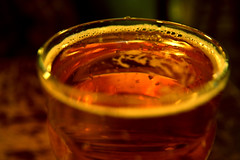
If you have a few beers, glasses of wine, or mixed drinks one evening, how does this impact your sleep and dreams? Can you still have lucid dreams that night? This is a somewhat controversial subject, and reasonably so. There are benefits and drawbacks to drinking the evening before lucid dreaming. If you search the Dream Views forum, you will get mixed answers as to whether or not lucid dreaming can be combined with drinking alcohol.
The Main Drawbacks of Drinking Alcohol Before Lucid Dreaming
Reduced Dreaming and Dream Recall: Drinking reduces the amount of time spent in REM sleep, and the number of dreams you will be able to recall. Even if you wake up and recall your dreams, you may be too tired write them in your dream log.
Difficulty waking up: Drinking can make it more difficult to wake up to record your dreams or perform a lucid dreaming induction technique in the middle of the night. Upon waking, you are usually in a groggier state, and have less willpower than if you had slept sober.
Other negative side effects of drinking before sleep: Interference with “restorative deep sleep” (N-REM) and suppression of Melatonin, which is a hormone that helps regulate sleep.
The Main Benefit of Drinking Alcohol and Lucid Dreaming: Suppressing REM, Causing REM Rebound after it has worn off
REM Rebound (Wikipedia definition): The lengthening and increasing frequency and depth of REM sleep which occurs after periods of sleep deprivation. When people are prevented from experiencing REM, they take less time to return to the REM state.
If you have a chance to sleep in on the morning after you are drinking: You can take advantage of REM Rebound. What does this mean? Earlier in the night, when the alcohol is still in your system, you won’t have very much “dream sleep” (REM). After it has worn off, you will have much more longer and vivid dreams during your later REM sleep.
If you can’t sleep in on the morning after you are drinking: You probably won’t remember much of your dreams from that night, or experience lucid dreams. You may have some dream recall, but this depends on how much you drank, and how early in the evening you stopped drinking. Luckily, the next night, when you are sleeping sober, you will likely have a REM rebound effect. This will allow you to experience more dreams, and have greater chances of lucid dreaming.
My Experiences With Lucid Dreaming and Alcohol
I keep a detailed log of the food, drinks and supplements I consume before attempting lucid dreaming. For the majority of lucid dreams I have logged, I didn’t consume alcohol the night before. But I have logged some lucid dreams after drinking one or two alcoholic beverages the night before. For me, it seems that one to two drinks is okay, but more than that has had a negative impact on my dream recall and lucid dreaming. Additionally, if I am going to drink before lucid dreaming, I will try to drink earlier, so the REM Rebound has time to kick in.
To learn more about lucid dreaming, sign up for your Free Lucid Dreaming Starter Handbook.
This post is part of the Dream Evolver Series
![]() photo credit: stevendepolo
photo credit: stevendepolo